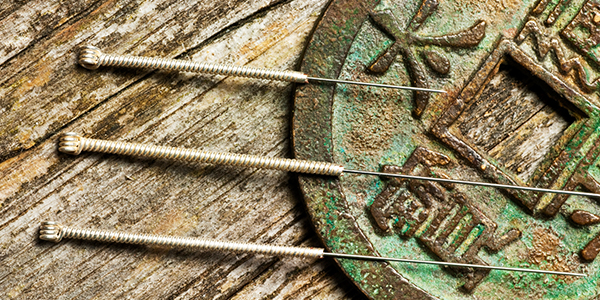 What is Acupuncture?
What is Acupuncture?
Acupuncture is a channel-based modality originating in China that has evolved over the course of the last 2,000 years. This safe and effective therapy involves the insertion of fine sterile needles into specific points to support local and channel regulation and to increase neurological, circulatory, electromagnetic and energetic functioning.
Other associated modalities may also be used as part of an acupuncture session including: Gua Sha, Cupping, Moxa or Tui Na Massage.
What conditions can be treated with Acupuncture?
Acupuncture can be useful in treating a broad range of musculoskeletal, constitutional and systemic conditions. Some examples include:
- Musculoskeletal injuries or other pain conditions
- Sleep
- Sinus or Ear issues
- TMJ
- Colds and flus, asthma, allergies or other respiratory or immune disorders
- Gynecological disorders and menopausal symptoms
- Digestive issues
- Hypertension and circulatory disorders
- Urinary, bladder, or prostate disorders
- Migraines
- Tinnitus
- Post-stroke paralysis,
- Neurological disorders
- Psycho-emotional disorders
- Fibromyalgia
- Auto-Immune disorders
- Fertility disorders
Is Acupuncture painful?
Acupuncture needles are extremely fine and are very different from the kind of needles for blood draws or injections. Often you may not feel the needle being inserted, or there may be brief mosquito-bite like ‘twinge’, which should dissipate within a breath or two. Your acupuncturist will be checking in with you while placing the needles and can make any necessary adjustments to support maximum comfort and relaxation.
What can I experience while resting with the needles?
Each acupuncture session is unique. Some common sensations while resting with needles may include: deep relaxation or even going to sleep, a dull, heavy or achy sensation near some areas of insertion indicating increased circulation and tissue release, warmth, tingling, a sense of ‘flow’, shifts in alignment while on the table or after the treatment even over the course of several days.
Is Acupuncture effective?
Just as each individual’s constitution, lifestyle and medical history varies, responses to acupuncture also vary. It is common to experience pain relief, or increased regulation in basic body functions such as digestion, sleep, energy etc. immediately after or during a period of time following an acupuncture session. The duration of symptom relief varies depending on factors such as the severity, etiology and duration of the ailment. Measures can be taken at home to further support or increase the effects of your acupuncture session including good diet, appropriate exercise, sleep hygiene, good posture and mindfulness to ergonomics. More than just being a quick fix, acupuncture is an effective tool to add to the tool box in your pursuit of robust health.
 What to expect during your acupuncture session:
What to expect during your acupuncture session:
First office visits include a 20-40 minute intake to discuss medical history, to do any necessary assessment and discuss herbal, lifestyle, ergonomic or other recommendations.
Acupuncture sessions run 45 min – 1 hour in conjunction with first office visits or as follow-up visits. The first portion of your acupuncture session will include a discussion of your treatment goals and assessment time. Needle insertion takes 15-30 minutes, then you will have time to rest with the needles for 20-45 minutes.
How should I prepare for my acupuncture session?
When possible wear loose fitting clothes that can be pushed up to the elbows or knees. It is helpful to be able to easily access abdominal areas directly above and below the belly button. Scrub tops and pants are also available for use during your treatment.
It is a good idea to have a small snack before your session.